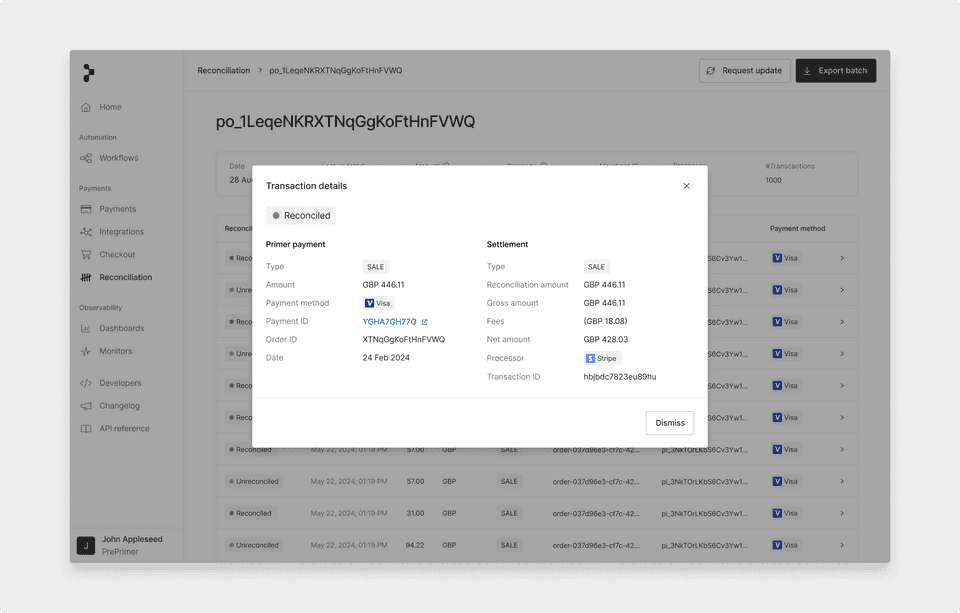
Primer has created a unified payments infrastructure and abstracted Payments, and Disputes. Our Reconciliation product represents the abstraction of settlement reports across processors.
Every processor provides different ways to access their settlement reports, in different formats, and with different data within their reports. Primer has created a unified report that allows you to consume your own settlement data much easier, and you only have to reason about one report, without having to learn all the differences and intricacies of direct integrations.
The report content focuses on transactional data, such as sales and refunds. We will forward additional transfers within reports sent by third parties. However, we do not process any additional reports outside of transaction reports. Refer to supported processors to see which reports we are consuming per processor.
Report structure
When we receive a settlement report from a processor, we create Primer Reconciliation Batches out of it based on the combination of processor + MID + Settlement currency. So Processor A + mid1 + EUR and Processor A + mid2 + EUR and Processor A + mid3 + GBP would be individual batches, even if Processor A were to send all of this into one report. Refer to the settlement report description to learn about the data and columns represented in the report.
Depending on the processor and merchant accounts used, it is possible for a report to contain payments across multiple presentment currencies with the same settlement currency.
Requesting a batch update
In the case of problems with the original data, the processor could issue a new report on their side. By requesting a batch update you can instruct Primer to reprocess and replace the existing report with the updated data.
Downloading a batch
You can download a batch from the reports overview, or from the reports detail page. No matter if you download the file from the dashboard or the SFTP folder, the content will be the same.
CSV Content
Refer to the settlement report description to learn about the data and columns represented in the report.
Filenames
- CSV files follow this convention, no matter if accessed via SFTP or Dashboard:
Primer_Unified_Report_{processor}_Batch_{batch_id}_Date_{payout_date}.csv(format for payout date:YYYY-MM-DD) - The logic for batch IDs is different per processor.
Good to know
- We start importing data from the time when reconciliation is enabled for you and don't backfill historic data.
- Individual batches could be updated (reprocessed) on demand. In this case, an existing file will be overwritten.
- Payout dates are not guaranteed to be unique. Depending on the processor and their setup, it is possible for two separate batches to have the same payout date.
- Data on sales is not guaranteed to be final within one payout. Depending on your processor, additional fees might show up days later. Examples of this include fees for Authorization and Capture, where the actions do not happen within the same payout period. Another example is fees that are only reported days later, like interchange fees with Checkout.com. In these cases, looking for the
reconciliationOrderIdis key to assign fees correctly. - Some processors will report additional data that is not tied to sales, such as account level fees. These will show in the report but will not be tied to a payment or
merchantId. - Some processors also split the reports based on criteria other than
merchantId, for example based on entities, where a merchant has multiple entities set up.
Setup
Speak to your Customer Success Manager or raise a ticket on our JIRA Service Desk to get access to our reconciliation product. Once access is granted, you will need to set up your processors accordingly and select the merchant accounts that you wish to enable.
After setup, as soon as Primer receives new settlement reports from the processors, we transform them into our unified format and make them available either in the dashboard, where they can also be downloaded individually as CSV files, or via SFTP folders.
Primer relies on the configuration of the processor and their payout and report generation intervals, which can differ from one provider to another (e.g., T+1, T+2, T+X).
Supported processors and reports
Settlement reporting, along with the available data and data granularity, differs between providers. See more details for each of the currently supported processors and reports per processor.
Reconciliation data in the dashboard
Accessing reconciliation data in the dashboard enables you to have immediate visibility into all batches that were created by Primer. The view allows you to see all reports across all processors, currencies, and payout dates.

The batch status can show you right away if all transactions were reconciled, or if there were any conflicts recorded.
Consuming reports via SFTP
It is possible to access and download the CSV files via SFTP on our production environment only. Speak to your Customer Success Manager or raise a ticket on our JIRA Service Desk to request access.
Primer will need a public key from you, and we support the following signing algorithms:
- ED25519:
ssh-ed25519 - RSA:
rsa-sha2-256,rsa-sha2-512 - ECDSA:
ecdsa-sha2-nistp256,ecdsa-sha2-nistp384,ecdsa-sha2-nistp521
We will then set up the access and send you a hostname and username.
- There is no retention period, all files created by Primer will be available in this folder.
- File names are based on batch IDs and payout dates. A new batch for a new payout date will always be a new file.
Batch reviews
Depending on the processor added, batches might not immediately show up on the SFTP folder or in the dashboard. This allows Primer to review incoming data and adjust logic if needed. While we aim to integrate the full extent of available transactions, we occasionally have to update mappings based on production data. Examples of when this is necessary include situations where processors do not support sandbox environments, have limited settlement reporting capabilities in sandbox versus production, or when data varies between merchant types or geographies. This review state allows Primer to validate the integration.